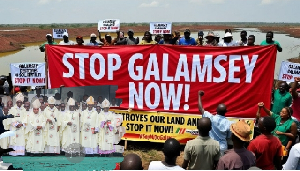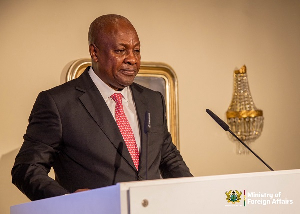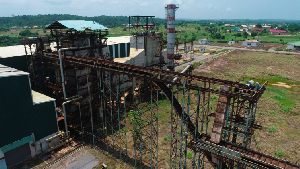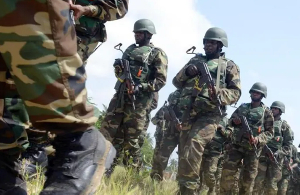The environmental, social, and economic devastation caused by illegal mining, commonly known as galamsey, continues to pose one of the greatest threats to Ghana’s future. The destruction of water bodies, farmlands, and forest reserves due to galamsey has reached crisis levels, compelling stakeholders across the nation to demand urgent and decisive action from the government.
Recently, organised labour issued an ultimatum to the government to take firm steps to address the galamsey menace, threatening an indefinite strike if meaningful actions were not undertaken. This proposed strike was a signal of the depth of frustration felt across the country as galamsey continues to erode the environmental and social fabric of the nation. However, following a meeting between the leadership of organised labour and the President of Ghana, the strike has since been called off, with the government reaffirming its commitment to the fight against illegal mining.
While the immediate strike has been averted (at least for now), it is important to reflect on the deeper lessons the situation presents, particularly in relation to accountability, governance, and the public's demand for tangible results in the fight against galamsey.
The Call for Government Action
The call for decisive government action to address galamsey is not new. Successive governments have grappled with this issue, with varying degrees of success. The challenge of galamsey touches on several critical dimensions of governance: natural resource management, environmental sustainability, the rule of law, and economic justice. According to the Constitution of Ghana, Article 257(6), "Every mineral in its natural state in, under or upon any land in Ghana, rivers, streams, water courses throughout Ghana, the exclusive economic zone and any area covered by the territorial sea or continental shelf is the property of the Republic of Ghana and shall be vested in the President on behalf of, and in trust for the people of Ghana..". This makes it the president's, and by extension, the government's (not a political party’s) legal responsibility to protect these resources from illegal exploitation.
While galamsey is often framed as a socio-economic problem—providing livelihoods for those in impoverished communities—it has spiralled into a crisis of national importance, requiring not just economic solutions but robust governance. The government must ensure that regulations are enforced, that illicit mining operations are shut down, and that violators are held accountable under the law.
Organised Labour’s Role: A Public Service
The decision by organised labour to issue an ultimatum regarding galamsey was not an isolated act of defiance but a response to the broader societal frustration with the ongoing destruction of Ghana’s natural resources. It was a reminder to the government of its constitutional duty to act in the interest of the people and the environment.
From a purely objective standpoint, organised labour’s engagement on this issue can be seen as a positive development for democratic governance. By holding the government accountable and expressing the concerns of citizens, organised labour performed an essential public service. The act of threatening a strike was not about political gamesmanship, but about signalling the gravity of the issue and the need for an urgent, transparent, and accountable response.
The eventual resolution, with the government reiterating its commitment to tackling galamsey, shows that constructive pressure from civil society can result in positive outcomes. It is a testament to the strength of democratic engagement that labour unions, acting within the framework of constitutional rights, can influence national policy in such a critical area.
The Importance of Sustained Government Action
While the strike has been called off, it is crucial that the government’s renewed commitment translates into meaningful action on the ground. Previous attempts to curb galamsey have been met with mixed results, and there is a well-founded concern that unless sustained measures are taken, the problem will persist. A comprehensive approach that includes stricter enforcement of mining laws, rehabilitation of affected communities, and the creation of alternative livelihoods for those involved in illegal mining is essential.
This is where a subtle yet important lesson lies: governments must be held to a standard of accountability that transcends political rhetoric. Organised labour's actions, and the broader public response, underscore the importance of ensuring that promises made are followed by actions. The fight against galamsey cannot be one of empty words; it must be seen through to its conclusion with the full force of the law.
A Lesson for Civil Society: The Power of Collective Action
The events leading up to the calling off of the strike also highlight the power of civil society in shaping national discourse. While the government has the primary responsibility to protect Ghana's resources, civil society—including labour unions, professional associations, and ordinary citizens—plays a critical role in ensuring that these responsibilities are met. The pressure applied by organised labour was instrumental in securing a renewed commitment from the government.
In this sense, organised labour's approach reflects a model of governance in which citizens and civil society actors work collaboratively to ensure that national issues, such as galamsey, are addressed with the seriousness they deserve. The broader lesson here is that in a democracy, governance is a shared responsibility between the government and the governed.
Moving Forward: A National Imperative
Looking forward, it is imperative that the government continues to demonstrate its commitment to eradicating galamsey through sustained action. The future of Ghana's natural resources—and by extension, the economic and social stability of the nation—depends on it. This is not a political issue; it is a national one. It is the responsibility of the government to lead the charge, but it is also the duty of all Ghanaians, regardless of political affiliation, to support efforts to protect the environment and ensure the sustainable use of the country’s resources.
Conclusion: A Collective Responsibility
The events surrounding the proposed strike by organised labour remind us that while the government holds the ultimate responsibility for solving national crises like galamsey, civil society has a crucial role to play in holding those in power accountable. The fact that the strike has been called off following renewed government commitments should not mark the end of public engagement on the issue. Rather, it should serve as a reminder that through collective action, citizens can shape the direction of national policy and demand accountability from their leaders.
This is not about partisanship or political manoeuvring. It is about ensuring that the government fulfils its constitutional duty to manage Ghana’s natural resources responsibly. In the fight against galamsey, we must all be stakeholders, demanding accountability, transparency, and sustained action for the sake of the nation’s future.
The author is a Senior Lecturer and a Chartered Accountant
Email: viclartey@yahoo.com
Opinions of Thursday, 10 October 2024
Columnist: Dr. Victor Curtis Lartey















